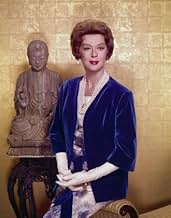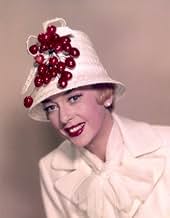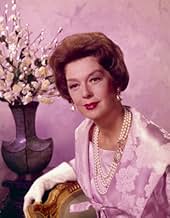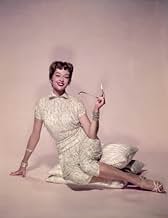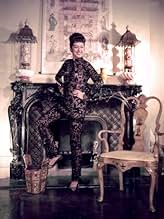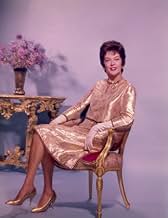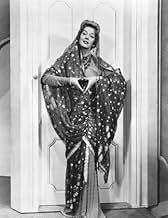NOTE IMDb
7,9/10
13 k
MA NOTE
Ajouter une intrigue dans votre langueAn orphan goes to live with his free-spirited aunt. Conflict ensues when the executor of his father's estate objects to the aunt's lifestyle.An orphan goes to live with his free-spirited aunt. Conflict ensues when the executor of his father's estate objects to the aunt's lifestyle.An orphan goes to live with his free-spirited aunt. Conflict ensues when the executor of his father's estate objects to the aunt's lifestyle.
- Réalisation
- Scénario
- Casting principal
- Nommé pour 6 Oscars
- 5 victoires et 12 nominations au total
Avis à la une
When "Auntie Mame" was first published, I read and re-read it (and its sequel, "Around the World with Auntie Mame") for several summers. Believe it or not, the books are even funnier than the film. They were not "memoirs," though that was the PR at the time. Edward Everett Tanner, or "Patrick Dennis," ultimately admitted as much. Auntie Mame was a creation from Tanner's own talented imagination.
No one ever has, or ever will, embody Auntie Mame as well as Rosalind Russell, who, by the time her Broadway performance in the role was filmed, had honed her portrayal to one of the finest in American theatre and film.
Listen to her vocal technique: from high girlish squeals to basso-profundo sarcasm.
Or watch her remarkable body language throughout -- from grande dame theatricality to lowbrow burlesque.
Russell's supporting players are magnificent -- from the 12-year old Jan Handzlik, through Coral Browne, Peggy Cass, Forrest Tucker, Fred Clark, Patrick Knowles, Connie Gilchrist, Yuki Shimoda, Robin Hughes, Roger Smith, Pippa Scott -- and, my own particular favorites who almost, but not quite, steal their scenes from Miss Russell: Willard Waterman, Lee Patrick and Joanna Barnes as the unforgettable Upsons.
George James Hopkins' brilliant sets and set design, and Orry-Kelly's amazing costumes, along with Branislau Kaper's score and Morton Da Costa's direction are like Tiffany settings, showing off this flawless cast at the top of their form.
Lawrence and Lee's original Broadway script was adapted by Betty Comden and Adolph Green, whose main contribution would appear to be the hydraulic furniture at the final dinner party.
The famous line, originally from the Broadway play and not found in the novel, is "Life is a banquet! And most poor sons-of-bitches are starving to death!" "Damn" and "hell" both are heard in the film: but "sons-of-bitches" was apparently too strong for the MPAA in 1958.
Is the film dated? I suppose. In the same way that "Citizen Kane" is dated, or "Some Like It Hot." It's also timeless. And Miss Russell's performance, here at the zenith of her long and distinguished comedic and dramatic career (Eugene O'Neill's "Mourning Becomes Electra," anybody?) is an acting lesson unto itself.
No one ever has, or ever will, embody Auntie Mame as well as Rosalind Russell, who, by the time her Broadway performance in the role was filmed, had honed her portrayal to one of the finest in American theatre and film.
Listen to her vocal technique: from high girlish squeals to basso-profundo sarcasm.
Or watch her remarkable body language throughout -- from grande dame theatricality to lowbrow burlesque.
Russell's supporting players are magnificent -- from the 12-year old Jan Handzlik, through Coral Browne, Peggy Cass, Forrest Tucker, Fred Clark, Patrick Knowles, Connie Gilchrist, Yuki Shimoda, Robin Hughes, Roger Smith, Pippa Scott -- and, my own particular favorites who almost, but not quite, steal their scenes from Miss Russell: Willard Waterman, Lee Patrick and Joanna Barnes as the unforgettable Upsons.
George James Hopkins' brilliant sets and set design, and Orry-Kelly's amazing costumes, along with Branislau Kaper's score and Morton Da Costa's direction are like Tiffany settings, showing off this flawless cast at the top of their form.
Lawrence and Lee's original Broadway script was adapted by Betty Comden and Adolph Green, whose main contribution would appear to be the hydraulic furniture at the final dinner party.
The famous line, originally from the Broadway play and not found in the novel, is "Life is a banquet! And most poor sons-of-bitches are starving to death!" "Damn" and "hell" both are heard in the film: but "sons-of-bitches" was apparently too strong for the MPAA in 1958.
Is the film dated? I suppose. In the same way that "Citizen Kane" is dated, or "Some Like It Hot." It's also timeless. And Miss Russell's performance, here at the zenith of her long and distinguished comedic and dramatic career (Eugene O'Neill's "Mourning Becomes Electra," anybody?) is an acting lesson unto itself.
With a perfect match between character and actress, Rosalind Russell's unforgettable performance as "Auntie Mame" is almost enough to carry the whole movie by itself. The story is also interesting, if quite contrived, and most of the supporting cast helps out when needed. The variety of settings and situations also helps to make the movie an effective portrait of a life.
The story works best when taken as an appreciative but light-hearted portrayal of a memorable character. Many of Mame's adventures are stylized, and they work best when not taken too seriously. Given that, there are plenty of amusing sequences, and just enough thoughtful moments to maintain some balance.
Russell herself is in her element. With a character whom it is almost impossible to overplay, she gives the role plenty of energy and charm. She also works very well with the other characters, giving believable (given the character) and usually interesting reactions to what they say and do.
In the supporting cast, Forrest Tucker and Peggy Cass make good use of their scenes, and Fred Clark works well as Mame's frequent adversary. Coral Browne gets some good moments as Mame's old friend. The filming was approached in a rather stagy fashion, yet much of the time this seems appropriate. All told, the movie has a number of strengths, yet the memory most likely to remain is Russell's portrait of Mame herself.
The story works best when taken as an appreciative but light-hearted portrayal of a memorable character. Many of Mame's adventures are stylized, and they work best when not taken too seriously. Given that, there are plenty of amusing sequences, and just enough thoughtful moments to maintain some balance.
Russell herself is in her element. With a character whom it is almost impossible to overplay, she gives the role plenty of energy and charm. She also works very well with the other characters, giving believable (given the character) and usually interesting reactions to what they say and do.
In the supporting cast, Forrest Tucker and Peggy Cass make good use of their scenes, and Fred Clark works well as Mame's frequent adversary. Coral Browne gets some good moments as Mame's old friend. The filming was approached in a rather stagy fashion, yet much of the time this seems appropriate. All told, the movie has a number of strengths, yet the memory most likely to remain is Russell's portrait of Mame herself.
From the cartoon kaleidoscope opening to the last walk up the staircase for Mame Dennis, this comically-contrived and highly theatrical movie version of the celebrated Broadway success is nevertheless pleasing in almost every sense. Director Morton DaCosta, who also helmed the stage version, uses the theatricality of the piece to his advantage, giving the proceedings the shiny look and feel of a holiday bauble. The movie takes off running, bursting with chatter and frivolity, and Rosalind Russell is a great crazy-quilt hostess, often going in three directions at once. The story of an orphaned lad in 1928 who goes to live with his batty aunt in New York City started life as a book by Patrick Dennis, with Russell playing the lead once it was turned into a play. The film-version doesn't try to disguise the stage origins, but then it doesn't really have to; DaCosta keeps the pacing so brisk, with characters entering and exiting rapidly, that initially the viewer may feel as though something important may have been missed. The picture isn't loaded down with artificial charm. On the contrary, the romantic sub-plot between Russell and oil tycoon Forrest Tucker (which, again, is quick--in and out) is genuinely sweet (this is Tucker's triumph as much as it is Russell's) and the supporting players are impeccably well-cast, bouncing off each other like frenetic ornaments. While the plot does slip into an episodic structure (and does feel a bit lengthy), the smooth maneuvering of characters and quirks and hang-ups and hang-overs is an awful lot of fun. As for Russell, she gives shading and feeling to this woman; her exuberance can be taken as a put-on (for laughs), yet we never lose sight of Mame Dennis as a ballsy, bright lady, and she never lapses into bitchiness. Mame may have been real, or maybe just a literary confection, but she isn't a phony. She believes life is a banquet, and gets us to believe it too. *** from ****
This is one of the best films I have EVER seen, and I watch a lot of films, as I am sure most of you do. First, it is an excellent adaptation of the book. They managed to follow the story line extremely well. Yes, somethings were left out, but all and all, they did a great job. Second, Rosaline Russell rocks! It doesn't matter what character she plays, she is fantastic, but she IS Mame, nobody can do it like her. Forget about the musical version (MAME) with Lucille Ball ( who is a great actress in her own right, but certainly not in the same ballpark with Ms. Russell). Third, it is not only funny, but heartwarming. The relationship between Mame and Patrick speaks volumes about what love should be, completely accepting of who the other person is, even if you don't always agree with them or like what they do. Fantastic family film, fun for everyone.
Rosalind Russell -IS- Auntie Mame and there is no doubt in my mind that she being cast in the role was a perfect choice. I read Dennis' book and I have to stress that anyone who loves this film but who has not read the book should read it. I think they did a great job in adapting the novel to film although I could imagine the great temptation to include the very racy parts of the novel. If they did include them, the "G" rating would probably have needed to be changed to "R". One of my favorite lines in the film is delivered so expertly by actress Coral Browne (Vera Charles), who upon being wakened out of a drunken sleep (with bottle still in hand) looks out the window at the sun and says "Ohhh---that moon is bright". Another favorite line delivered by Russell (in Mame's comment about Vera Charles' phony English accent) "When your from Pittsburgh, you have to do something". Rosalind Russell brought such magic to the character of Auntie Mame so much so, that I wish I had an Aunt like her. Auntie Mame helps stress the point to appreciate diversity in life and to live life to the fullest. I have often chosen to watch my copy of this film when feeling low and I can tell you it is a spirit lifter.
Le saviez-vous
- AnecdotesRosalind Russell broke her ankle in the first take of the scene where she comes flying down the stairs in the gown with the capri pants and shooting had to be delayed until she recovered.
- GaffesIn 1929 Mame and Lindsey talk about what Dr. Spock has to say on child rearing, a decade before his famous book was published.
- Citations
Mame Dennis: Oh, Agnes, where is your spine? Here you've been taking my dictation for weeks and you don't get the message of my book. Live, that's the message!
Agnes Gooch: Live?
Mame Dennis: Yes! Life is a banquet and most poor suckers are starving to death!
- ConnexionsFeatured in AFI's 100 Years... 100 Laughs: America's Funniest Movies (2000)
Meilleurs choix
Connectez-vous pour évaluer et suivre la liste de favoris afin de recevoir des recommandations personnalisées
Détails
- Date de sortie
- Pays d’origine
- Langues
- Aussi connu sous le nom de
- Vivir es mi deseo
- Lieux de tournage
- Société de production
- Voir plus de crédits d'entreprise sur IMDbPro
Box-office
- Budget
- 2 240 000 $US (estimé)
- Durée
- 2h 23min(143 min)
- Rapport de forme
- 2.35 : 1
Contribuer à cette page
Suggérer une modification ou ajouter du contenu manquant


